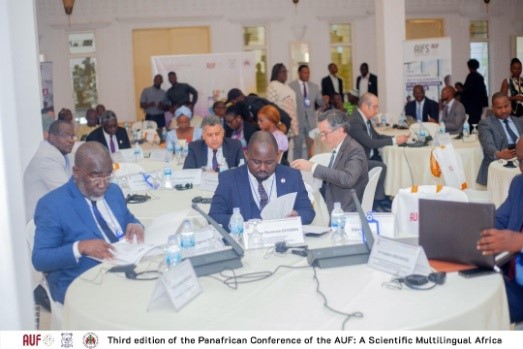By Mariama Marong
The University of The Gambia together with the Ministry of Higher Education, Research, Science and Technology, and in collaboration with The Agence Universitaire de la Francophonie (AUF), on Thursday 25 April 2024 held the 3rd Edition of the Pan-African conference on Scientific Publication and Research, in the Gambia on the theme: “Scientific Publication and Academic Mobility in Pluri-lingual Africa:Towards Strengthened Regional Collaboration.”
According to the organizers, the gathering underscores the importance of fostering collaboration and dialogue among higher education stakeholders within the region. The two-day convergence was attended by the Ministers of Foreign Affairs, Higher Education, Research, Science and Technology, Vice Chancellor UTG, Head of Francophone Universities and delegates from eleven countries.
Held at a local hotel in Bijilo, the primary objective of the conference, according to Professor Herbert Robinson, the Vice Chancellor of the University of The Gambia, is to facilitate the exchange of experiences and discussions on areas of partnership opportunities for the promotion of scientific publication and to enhance the international mobility of students within Africa.
Professor Robinson in his remarks to stakeholders, who also include esteemed representatives from various African countries and academic institutions, said they can collectively work towards advancing the educational landscape of the continent.
He expressed the honor on behalf of the country in hosting the 3rd Edition of the AUF, saying the event unites them as Africans in sharing their commitment to advance knowledge.
“Research addresses unique challenges in the field of academia and this gathering will help us find solutions on issues that our societies are faced with,” the UTG Vice Chancellor said. He highlighted the importance of research and technology in the advancement of any development, and said the two play pivotal roles in addressing food insecurity that the continent is encountering at the moment, and will be able to also address the issues of climate change through the use of scientific research and technology.
The UTG head lamented on the low publication of scientific work and research in Africa and said the conference will pave way for academic researchers and professors to reflect on science and other matters, by enhancing regional cooperation.
On his part, Professor Pierre Gomez, the Minister of Higher Education, Research, Science and Technology alluded on the challenges that researchers and scientific institutions battle with.
“Research is something fundamental in the promotion of sustainable development;’’ he said and called on the need to develop research infrastructure and culture for the better understanding of students and lecturers.
Minister Gomez noted that Universities and research are well kept in the four corners of the room, but there is need to expose them and make them visible to the public domain because research should be able to create job opportunities.
“It is important to expose the works academics and researchers, and it is the role of academics to break barriers and to talk with leaders in addressing the shackles that exist,” he said.
Mr. Gomez said it is crucial to promote research for acceptability and socio-economic development purposes; for influencing good policies in countries and for the promotion of culture.
Professor Slim Khalbous, the Rector of Agence Universitaire de la Francophonie, said the conference is the conference of deciders who will bring change in the field of research and scientific publication, adding that Universities are vectors of development through research.
Mr Khalbous said Universities have roles to play in the advancement and development of society because they are meant to serve as change agents for the betterment of all.
Mr. Momodou Tangara, the Minister of Foreign Affairs, said the Pan-African conference aims to strengthen research and work of African scientists. He said the meeting will promote scientific excellence for regional development cooperation, and therefore described the event as a unique opportunity to chart a course for the future collaboration of all.


















